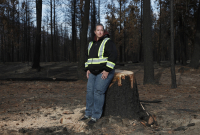Support strong Canadian climate journalism for 2025
CNO Local Journalism Initiative reporter Matteo Cimellaro added “international award-winning” in front of his title this week.
Covering Climate Now, a global journalism organization co-founded by the Columbia Journalism Review and The Nation magazine in association with the Guardian and WNYC, recognized Cimellaro in the justice category for his coverage of the disproportionate impact on First Nations of Canadian wildfires, writing that:
"Wildfires in Canada have devastated communities across the country — but none more so than those of First Nations. In this ambitious series from Canada’s National Observer, journalist Matteo Cimellaro weaves together human-focused narratives, intimate photography, and thorough data work to show the harm that more than a decade of wildfires have caused Indigenous people, not least displacement from land they’ve called home for generations. Judges called the work immediately captivating and said it lands with a huge impact."
The category features stories at the forefront of the climate crisis that connect climate change with unexpected systems of injustice. Matteo’s series on the effect of wildfires on remote First Nations communities was chosen from over 1,250 entries submitted from around the world.
In the series, Matteo travelled to the Skwlāx te Secwepemcúl̓ecw First Nation, north of Kelowna, BC, to tell the story of communities fleeing devastating wildfires over the last decade through intimate photographs and visualized data. The narrative touched on themes of displacement and highlighted individuals stepping up to ensure the well-being of their communities.
The stories document the gap between emergency services for First Nations and the rest of Canada and delve into the impacts of wildfire smoke on people on the front lines.
“It was incredibly difficult bearing witness to the damage and destruction that wildfires have caused,” said Matteo.
“To see how bad wildfires can be, but also how bad we've let them be in terms of the climate crisis, as well as land management practices [is a] warning, and unfortunately, a tragedy too.”
He considers the opportunity to tell the story of Skwlāx and other First Nations during the wildfire crisis an “honour”.
The stories were produced as part of the Local Journalism Initiative, which allows other publications to republish them for free — and they did. Matteo's stories were republished across the country, in the Vancouver Sun, the Penticton Herald, Indigenous Watchdog, the Climate Disaster Project, Turtle Island News, and by the American magazine, Mother Jones.
CNO publisher Linda Solomon Wood called the achievement “incredibly impressive” and said it was gratifying to see Matteo’s hard work recognized. "Sometimes it's colleagues from far away who recognize the quality of the work we do in Canada first and appreciate it most."
As a previous judge on the Covering Climate Now panel, she noted the fierceness of the competition from all over the world. Matteo’s recognition is "a truly great achievement," she said.
“It feels good to be seen on that international stage and have those stories… seen by readers globally,” added Matteo. “I feel like the hard work is paying off.”
“There's so much to take away, but I think the big one is learning to live with fire and the kind of support that the most vulnerable need.”
Matteo’s stories were in great company with other winning journalists who covered climate from different angles in publications such as The Guardian, The New Yorker, CNN, Al Jazeera, Politico, and more.
You can read Matteo’s winning stories here, here, and here — and the full series here.






Comments